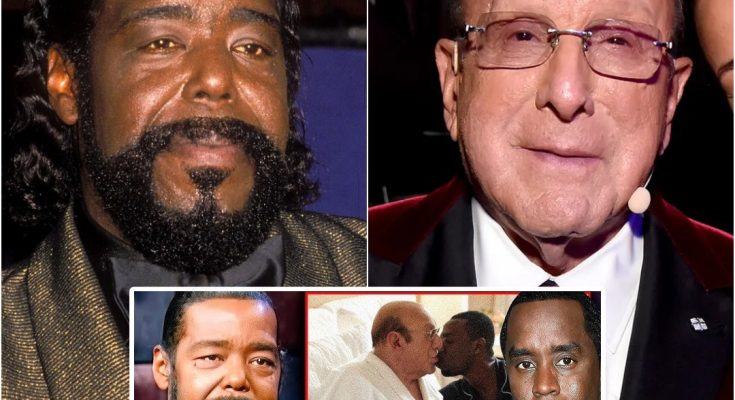Clive Davis has been one of the most powerful figures in the music industry for decades, but behind the scenes, not every artist had a smooth relationship with him—including the legendary Barry White. Now, shocking claims are surfacing that Davis allegedly wanted Barry White gone, and the reason behind it is raising serious questions.
Barry White, known for his deep, soulful voice and timeless hits, was a self-made success who built his career without relying on major industry gatekeepers. But some insiders suggest that his independence and refusal to conform to industry pressures put him at odds with Clive Davis. Could Barry’s success have threatened Davis’ influence? Did industry politics play a role in attempts to sideline him?
As more details emerge, fans are questioning whether Barry White was intentionally pushed out of the spotlight. This story dives deep into the hidden power struggles that shaped the music industry and why Clive Davis may have seen Barry White as a problem rather than an icon.

Barry White was one of the most legendary voices in R&B history, known for his deep, soulful voice and timeless love songs. However, behind the glitz and glamour of his successful career, White was also known for his outspoken nature and fearless attitude. And according to insiders, this was precisely what put him at odds with music mogul Clive Davis. The industry is often ruthless to those who refuse to conform, and Barry White was no exception. His boldness, independence, and resistance to industry manipulation made him a target. But what was the real reason Clive Davis wanted Barry White gone?
A Music Industry Power Struggle
The music industry has long been plagued by stories of powerful executives using their influence to control artists. Barry White, unlike many others, was unwilling to play by the industry’s rules. His defiance didn’t sit well with Clive Davis, who saw him not only as a remarkable talent but also as a potential threat to his stronghold over the music business.
While Clive Davis is known for launching the careers of several legendary artists, he has also been rumored to have engaged in questionable business practices to maintain his power. Barry White, a self-made success, operated on his own terms, producing and writing his music, and even launching his own record label. This level of independence was rare in an industry controlled by executives like Davis, and it soon put White in direct conflict with him.
Barry White’s Rise and Defiance
Born in Texas on September 12, 1944, Barry White grew up in South Central Los Angeles, surrounded by the realities of street life. Unlike many artists who entered the industry through traditional routes, White’s entry into music was unexpected but ultimately life-changing. After a troubled youth that included jail time for petty crimes, White decided to leave his past behind and pursue music.
His career took off in the 1960s when he became involved with various record labels, but it was in the 1970s that he achieved real stardom. White’s deep, resonant voice and distinctive romantic style made him a favorite among fans, earning him multiple Grammy Awards and widespread acclaim. Unlike many artists, however, White was business-savvy. He took control of his career, ensuring that he had a say in his music, production, and distribution. This level of independence was rare for Black artists at the time, making him a pioneer but also a target.
Clive Davis vs. Barry White: A Battle for Control
During the height of his career, Barry White established his own record label, Unlimited Gold, a move that positioned him as one of the few Black artists who owned their music and had creative control over their work. This was a direct challenge to industry executives like Clive Davis, who preferred artists to remain dependent on their labels.

Sources suggest that White’s refusal to be controlled by the industry led to efforts to sideline him. Clive Davis, who had considerable influence, was reportedly not pleased with White’s growing independence. According to insiders, White’s willingness to speak out against the greed and corruption in the industry made him a problem. Some reports even suggest that Davis tried to undermine White’s career, limiting his opportunities and reducing his visibility in the music scene.
The Dark Side of the Industry
There have long been whispers about the dark underbelly of the music industry, where power struggles, backdoor deals, and exploitation are common. Barry White was vocal about the greed that consumed many executives, warning fellow artists about the dangers of giving too much control to industry figures.
Rumors also circulated about Clive Davis’s personal life and his alleged influence over artists’ careers. Some even compared his tactics to those of other controversial industry figures like Diddy, questioning why so many artists under his label faced mysterious downfalls or untimely deaths. Barry White was determined to avoid a similar fate, which is why he took drastic steps to secure his future in music.
Barry White’s Untimely DownfallDespite his best efforts to maintain his independence, Barry White faced significant challenges in the latter part of his career. As the disco era faded, his success on the pop charts declined. His record label, Unlimited Gold, also faced financial difficulties, forcing him to focus more on touring rather than producing new music.
However, White made a comeback in the 1990s with his album Put Me in Your Mix, followed by The Icon Is Love, which returned him to the top of the R&B charts. His single Practice What You Preach became his first No. 1 hit in almost two decades. Despite these successes, he continued to face obstacles behind the scenes.

Many believe that White’s declining health was not just a result of his weight and heart issues but also a consequence of the immense stress and industry pressures he endured. In 2003, Barry White suffered a stroke and passed away the following year at the age of 58. Some speculated that the industry had taken its toll on him, leading to a decline in his well-being.
Did Clive Davis Play a Role?
While there is no direct evidence linking Clive Davis to Barry White’s downfall, many insiders believe that Davis’s influence played a significant role in limiting White’s opportunities. White’s decision to operate outside the traditional record label system was seen as a direct challenge to the industry’s power structure, and this likely led to efforts to suppress his career.
Additionally, White was not the only artist who reportedly faced challenges under Davis’s leadership. Similar concerns were raised about Luther Vandross, another legendary artist signed to Clive Davis, who also faced whispers about his personal life and industry struggles. Vandross, like White, suffered from health issues that ultimately led to his passing in 2005.
Barry White’s Legacy and the Unanswered QuestionsDespite the challenges he faced, Barry White left behind an enduring legacy. His music continues to be celebrated, and his influence on R&B and soul music is undeniable. His ability to maintain control over his artistry, even in the face of industry opposition, remains an inspiration for artists today.

However, questions still linger about the extent of Clive Davis’s role in White’s struggles. Did Davis actively work against White, or was White simply a victim of an unforgiving industry? The whispers surrounding Davis’s tactics have persisted, and as more artists come forward about their experiences, the truth may eventually come to light.
Final ThoughtsBarry White’s career was marked by both immense success and significant challenges. His refusal to conform to industry norms made him a target, and his clashes with powerful executives like Clive Davis likely contributed to his struggles. Whether or not Davis played a direct role in sidelining White, one thing is clear—Barry White’s influence on music and his fight for artistic independence will never be forgotten.



